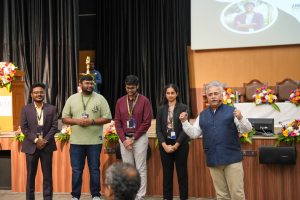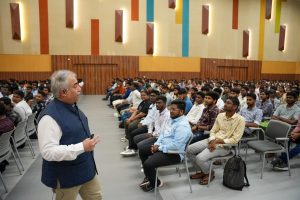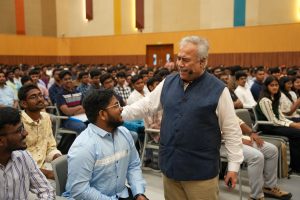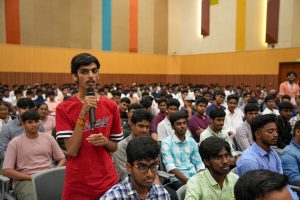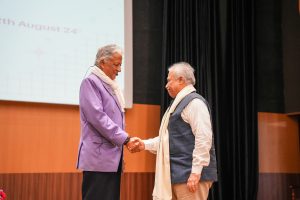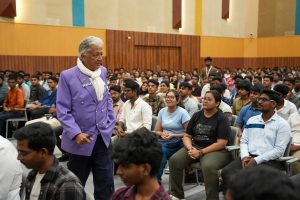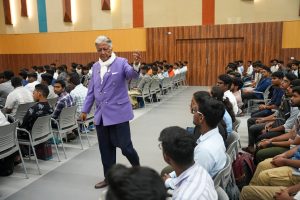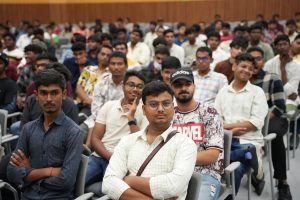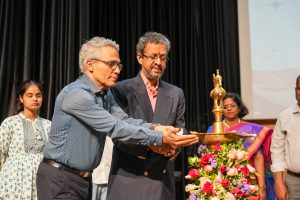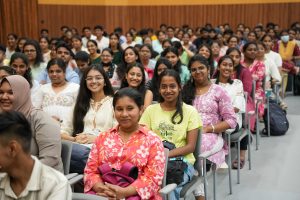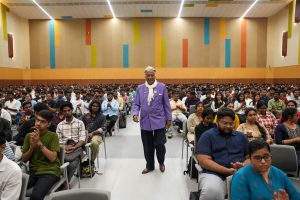Dr Vineeth Thomas Analyses Challenges Ahead for Modi’s Third Term
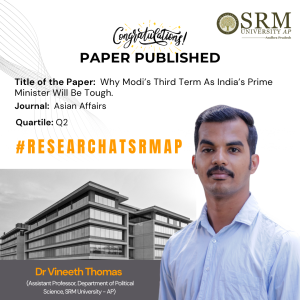 Dr Vineeth Thomas, an Assistant Professor in the Department of Political Science, has recently published a thought-provoking paper titled “Why Modi’s Third Term as India’s Prime Minister Will Be Tough” in the distinguished journal Asian Affairs. In his comprehensive analysis, Dr Vineeth delves into the political landscape of India and the various challenges Prime Minister Narendra Modi may face if he seeks re-election for a third consecutive term in 2024. Drawing on an array of political theories and current socio-economic indicators, the paper examines the underlying factors shaping Indian politics and public sentiment.
Dr Vineeth Thomas, an Assistant Professor in the Department of Political Science, has recently published a thought-provoking paper titled “Why Modi’s Third Term as India’s Prime Minister Will Be Tough” in the distinguished journal Asian Affairs. In his comprehensive analysis, Dr Vineeth delves into the political landscape of India and the various challenges Prime Minister Narendra Modi may face if he seeks re-election for a third consecutive term in 2024. Drawing on an array of political theories and current socio-economic indicators, the paper examines the underlying factors shaping Indian politics and public sentiment.
Dr Thomas argues that while Modi’s leadership has been marked by significant economic reforms and a robust foreign policy, the landscape is shifting in a manner that could complicate his re-election bid. Key issues explored in the paper include rising economic disparities, increasing urban unrest, and the challenge of maintaining communal harmony in a diversely populated nation.
The findings of this research are particularly pertinent in light of ongoing debates surrounding economic policy, agrarian distress, and the role of civil liberties – a backdrop that could significantly influence electoral dynamics heading into 2024.
The publication of this paper not only highlights Dr Thomas’s expertise in political science but also underscores the vital role academic discourse plays in contemporary political analysis. His insights contribute to a deeper understanding of India’s complex interplay between governance and public perception.
Abstract of the Research
On 9 June 2024, Narendra Modi became India’s Prime Minister for a third consecutive term, a feat previously accomplished only by Jawaharlal Nehru. However, this historic victory also began one of the most uncertain periods of his prime ministership. The fractured outcome of India’s 18th general election has created a fundamentally different political landscape. Modi’s Bharatiya Janata Party (BJP) secured just 240 seats, a significant drop from its 2019 tally, and was therefore short of an absolute majority. Although the BJP-led National Democratic Alliance (NDA) did win a majority, Modi will now be dependent upon coalition partners, necessitating a shift towards a more collaborative governance style.
Research in Layperson’s Terms
In the recent election, Modi’s party, the BJP, won only 240 seats, much fewer than in the last election and not enough for a clear majority. Although the broader alliance led by the BJP still has a majority, Modi now needs to rely more on other parties in the alliance to govern. This means he will have to work more closely with his coalition partners and be more collaborative in his leadership style.
Research Paper in the Citation Format
Vineeth Thomas, Agney GK & Arsha V Sathyan (2024), Why Modi’s Third Term As India’s Prime Minister Will Be Tough, Asian Affairs, ISSN: 0306-8374
(Routledge, SCOPUS/WoS Indexed)
Practical implementation or the social implications associated with Research
The practical implementation of my research lies in shaping policies that promote gender equality in political representation. By identifying barriers and proposing solutions, it aims to enhance women’s participation in politics, leading to more inclusive governance. The social implications include fostering a more equitable society with diverse perspectives in decision-making.
Your collaborations
Electoral Politics
Your Future Research Plans
Indian govt and politics
- Published in Departmental News, News, Political Science News, Research News
SRM AP Partners with ISF as Regional Hub for Rural Ankura Yatra Semi-Finals
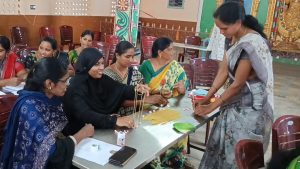 In a pioneering move to promote innovation and entrepreneurship at the grassroots level, SRM University-AP is proud to announce its partnership with the International Startup Foundation (ISF) as the regional hub for conducting the semi-finals of the Rural Ankura Yatra. This ambitious initiative by ISF seeks to ignite the entrepreneurial spirit across tier 2 and 3 cities and rural areas, identifying and nurturing latent entrepreneurial talent.
In a pioneering move to promote innovation and entrepreneurship at the grassroots level, SRM University-AP is proud to announce its partnership with the International Startup Foundation (ISF) as the regional hub for conducting the semi-finals of the Rural Ankura Yatra. This ambitious initiative by ISF seeks to ignite the entrepreneurial spirit across tier 2 and 3 cities and rural areas, identifying and nurturing latent entrepreneurial talent.
The Rural Ankura Bus Yatra, spearheaded by ISF, is more than just a journey—it’s a celebration of the entrepreneurial potential nestled within the heart of rural Andhra Pradesh. By uniting global CXOs, mentors, investors, researchers, and educators, this statewide yatra aims to strengthen the rural startup ecosystem, ultimately catalysing job creation and fostering economic growth in underserved regions.
The startup pitch contest, a key component of the Yatra, will serve as a platform for rural innovators to showcase their ideas and solutions to local problems. This initiative aligns seamlessly with SRM University-AP’s mission to drive innovation and entrepreneurship across the country.
Vice-Chancellor of SRM University-AP, Prof. Manoj K Arora, expressed his enthusiasm for the partnership, stating, “At SRM University-AP, we are deeply committed to fostering a culture of innovation and entrepreneurship. Partnering with ISF for the Rural Ankura Yatra allows us to extend our mission beyond urban centres, empowering rural innovators to drive meaningful change within their communities.”
The regional semi-finals at SRM University-AP are scheduled for September 11, 2024. The event is expected to draw over 500 participants from various districts, with the top 20 teams—10 from each category—advancing to the final demo day. These teams will have the opportunity to exhibit their ideas and solutions at SRM University-AP, vying for the support and investment needed to bring their ventures to life.
A distinguished panel of high-profile delegates, including professors from SRM University-AP and leaders from ISF, will serve as the jury, selecting the most promising ventures for the finals. Notably, five offers from venture capitalists associated with ISF will be extended to the top ventures.
Dr Siddharth Shankar Tripathi, Director of Entrepreneurship and Innovation at SRM University-AP, added, “The Rural Ankura Yatra is a remarkable initiative that aligns with our vision of holistic development. By nurturing entrepreneurial talent in rural areas, we are not only fueling economic growth but also promoting sustainable development.”
Mr J.A. Chowdary, Founding Director of Software Technology Parks of India and former IT Advisor and Special Chief Secretary to the Chief Minister of AP, emphasised the importance of the Yatra, stating, “The Rural Ankura Yatra is a vital step towards unlocking the vast potential of rural India. By bringing together global expertise and local talent, we aim to create a thriving ecosystem that supports innovation and entrepreneurship at the grassroots level.”
SRM University-AP has consistently championed entrepreneurship as an economic growth and social change catalyst. One of the university’s flagship initiatives, ADITRI, stands as a testament to this commitment. As a pioneering CSR project, ADITRI is dedicated to supporting and empowering rural women entrepreneurs in Andhra Pradesh. With funding of ₹2 crores, the project aligns with the university’s mission to promote innovation and social responsibility, focusing on economic empowerment, job creation, gender equality, and community development.
Through initiatives such as Micro Entrepreneurship Bootcamps and the Rural Women Innovation and Entrepreneurship Hub (RWIEH), SRM University-AP continues to make a significant impact, having already reached over 1400 women across various mandals in Andhra Pradesh. As the university steps into the role of a regional hub for the Rural Ankura Yatra, it reaffirms its commitment to nurturing the next generation of entrepreneurs who will drive India’s socio-economic transformation.
- Published in Departmental News, IDEA NEWS, News
A Pathway to Sustainable Active Food Packaging
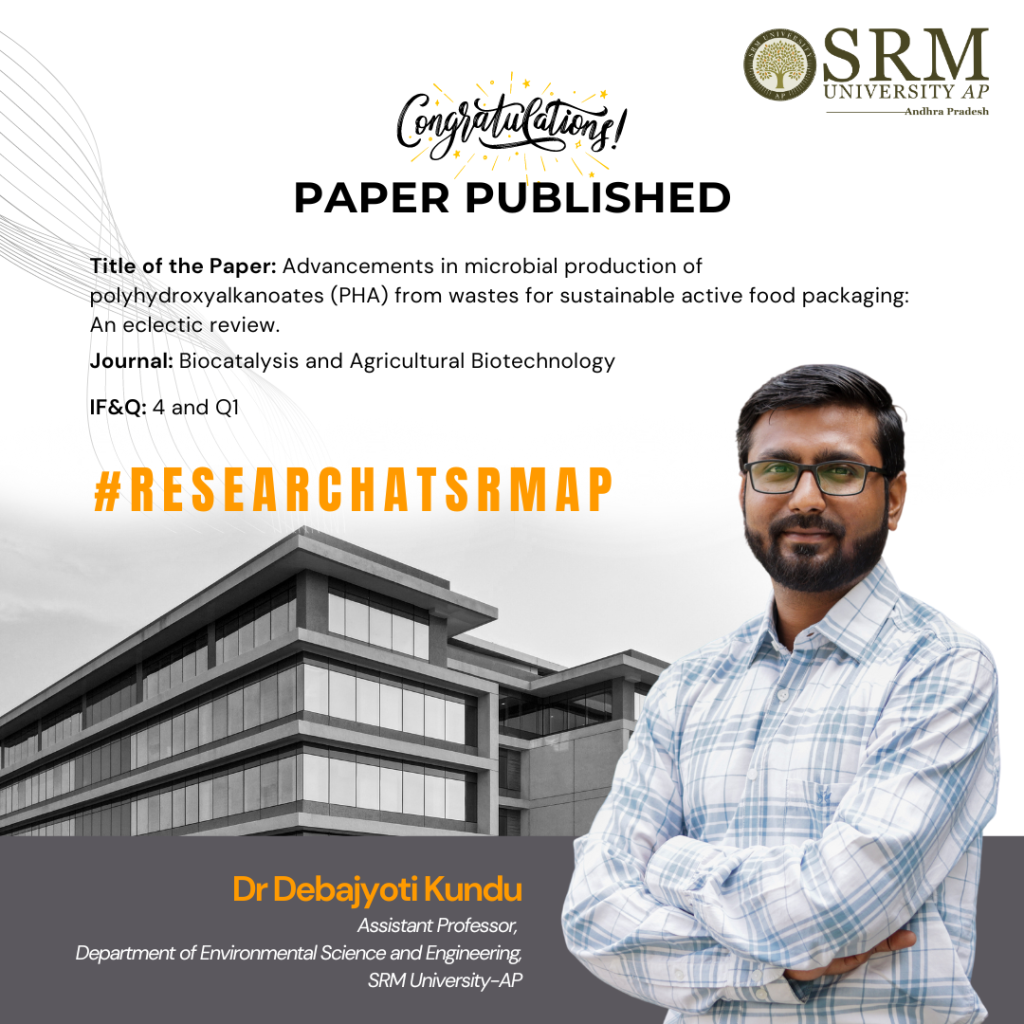
Dr Debajyoti Kundu, Assistant Professor, Department of Environmental Science and Engineering, has conducted an impactful study on developing polyhydroxyalkanoates (PHA), an eco-friendly solution that can help reduce plastic waste and make food packaging more sustainable. His recent paper “Advancements in microbial production of polyhydroxyalkanoates (PHA) from wastes for sustainable active food packaging: An eclectic review”, published in the Q1 journal Biocatalysis and Agricultural Biotechnology, Dr Debajyoti investigates how microorganisms can convert waste into a special type of plastic called PHA, which can be used for food packaging.
Unlike regular plastics, PHA is biodegradable and safe for both the environment and human health. The study reviews recent innovations in making PHA stronger and more effective for packaging, including its ability to prevent food spoilage and improve food safety.
Abstract
This study explores advancements in microbial production of polyhydroxyalkanoates (PHA) from waste resources for sustainable active food packaging. It highlights the eco-friendly nature of PHAs as bioplastics and their potential to replace synthetic plastics in food packaging. The paper discusses recent technological improvements in PHA production and formulations, focusing on enhancing material properties to make PHA a viable alternative. It also examines trends in active packaging, including antimicrobial, antioxidant properties, and spoilage indicators, which can significantly improve food safety and quality.
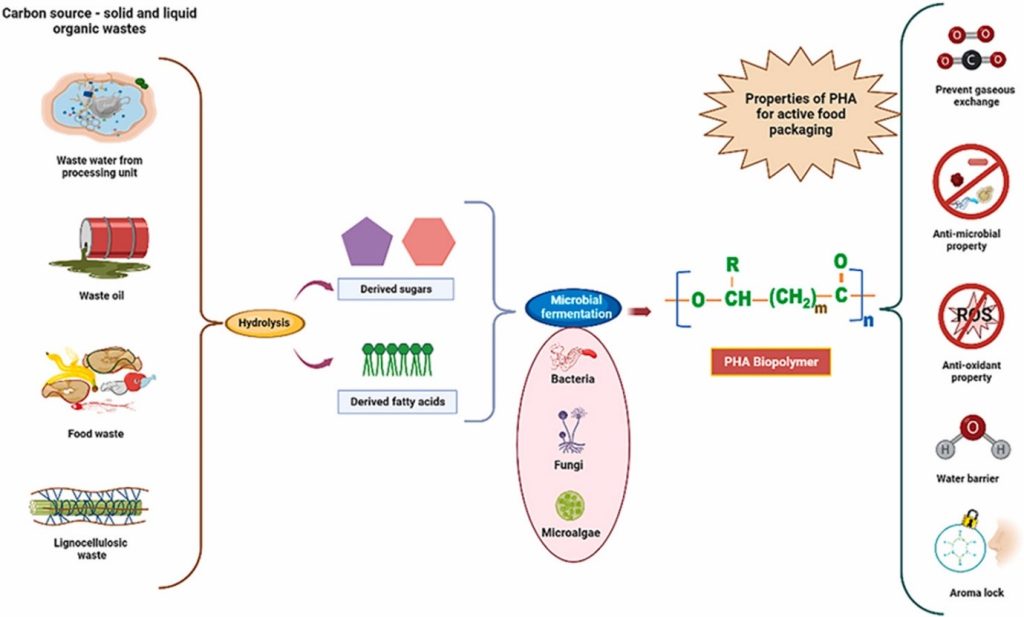
Practical Implementation/ Social Implications of the Research
The practical implementation of this research involves using PHA-based materials for food packaging to replace conventional plastics. This can lead to reduced environmental pollution due to PHA’s biodegradability and lower reliance on fossil fuels. Social implications include improved food safety through active packaging features like antimicrobial and antioxidant properties, potentially reducing foodborne illnesses and extending shelf life. Additionally, using waste to produce PHA promotes waste recycling and resource efficiency.
Collaborations
This research is a collaborative effort among various prestigious institutions including St. Joseph’s University, SRM Institute of Science and Technology, Gurudas College, and SRM University-AP.
Moving forward, Dr Debajyoti will continue to work on improving the production processes and formulations of PHA to enhance its mechanical properties and cost-effectiveness. Additionally, he will explore new waste sources for PHA production and develop advanced active packaging technologies, such as smart packaging with sensors for real-time monitoring of food quality. Collaborations with industry partners to scale up production and test real-world applications of PHA-based packaging are another key focus.
- Published in Departmental News, ENVS News, News, Research News
New Chapter Begins: Over 3000 Students Start Their Journey at SRM AP
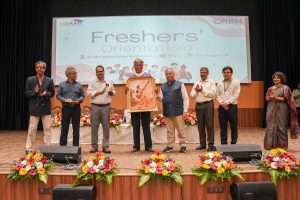 SRM University-AP extends a warm welcome to its newest cohort of students as it kicks off the much-anticipated “UDAAN 2024” orientation programme. This 10-day event, running from August 12 to August 23, is meticulously crafted to seamlessly integrate more than 3000 freshers from more than 20 states of India into the vibrant campus life and academic environment.
SRM University-AP extends a warm welcome to its newest cohort of students as it kicks off the much-anticipated “UDAAN 2024” orientation programme. This 10-day event, running from August 12 to August 23, is meticulously crafted to seamlessly integrate more than 3000 freshers from more than 20 states of India into the vibrant campus life and academic environment.
The event began with the traditional lighting of the lamp and an invocation ceremony, setting a tone of reverence and inspiration. During the inaugural session, students were given an overview of the university’s various directorates, schools, and the academic ecosystem, providing them with essential knowledge about their new environment. Deans and directors from all departments were present, underscoring the importance of this milestone in the student’s academic journey.
Pro-Chancellor, SRM University-AP Dr P Sathyanarayanan, extended his warmest wishes to the students, stating “At SRM AP, we are dedicated to shaping the next generation of leaders, innovators, and change-makers. With UDAAN 2024, we are excited to empower our students as they embark on this transformative educational journey. It is our hope that this experience inspires each of you to achieve excellence and make a meaningful impact on the world. Welcome to a vibrant community where your future truly begins.”
Vice Chancellor, SRM University-AP, Prof. Manoj K Arora, addressed the new students, encouraging them to embrace self-reliance and to make the most of every opportunity during their time at the university. He motivated the students and said that they have an opportunity to learn new things, acquire new knowledge, grow new competencies, develop new skills and enhance their personal attributes in profound ways that will shape their character for the rest of their lives. Prof. Arora further added that the students have an opportunity to weave new friendships that will impact their lives in incredible ways and that education is not only about acquiring knowledge and skills, but it also prepares us for life.
The programme was honoured by the presence of Indian Ambassador Deepak Vohra ji, Special Advisor to Prime Minister in Africa and Ladakh, who was the chief guest for the event. His address to the students motivated them on how to attain great heights in their careers even in adverse situations through relentless goal setting, hard work, dedication and determination. He further told the students that if we are divided, we can go fast, but if we are united, we can go far. Deepak Vohra concluded his speech with this line, “The future of India is the future of the world. The whole world trusts India because we are intrinsically good people. You are the hope for the future of a safe and secure world.”
Throughout this 10-day programme, students will participate in a series of sessions designed to familiarise them with the university’s offerings. These include introductions to the academic departments, faculty, and administrative staff, as well as insights into the various clubs and associations that contribute to a holistic educational experience at SRM University-AP.
- Published in News, student affairs news


